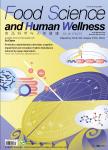Exogenous ketogenic supplements can mitigate the susceptibility to Alzheimer’s disease induced by chronic sleep deprivation:emerging role of Sirt1 in ferroptosis
作者机构:Institute of Biopharmaceutical Research, Liaocheng University College of Food Science and Engineering, Ocean University of China Pet Nutrition Rresearch and Development Center, Gambol Pet Group Co.,Ltd.
出 版 物:《Food Science and Human Wellness》 (食品科学与人类健康(英文))
年 卷 期:2024年
核心收录:
学科分类:1002[医学-临床医学] 100203[医学-老年医学] 10[医学]
摘 要:Emerging evidence supports that sleep disorders are the main risk factor for sporadic Alzheimer’s disease (AD), and iron dysregulation may be the link between them. Our previous studies have confirmed that ketogenic diet (KD) can prevent chronic sleep deprivation-induced AD. However, it is uncertain whether exogenous ketones supplements (EKS), as an alternative intervention, have the same effects as KD. Thus, we investigated the prophylactic efficiency of EKS on chronic sleep deprivation-induced AD and reveal the underlying mechanism focus on iron metabolism. We observed that the prophylactic efficacy of EKS against chronic sleep deprivation-induced AD was comparable to that of KD. Meanwhile, our results suggest that both EKS and KD inhibited iron metabolism disorder through regulation of iron metabolism-related proteins. Moreover, we found that both EKS and KD reduced hippocampal mitochondrial dysfunction and iron-mediated lipid peroxides. Furthermore, EX527 (Sirt1 inhibitor), mostly abrogated these above protections of EKS, suggesting that the prophylactic effect of EKS on AD is partly dependent on Sirt1. Our findings provide novel evidence that EKS can be developed as functional foods to prevent or delay the development of AD, particularly in individuals with sleep disorders.



